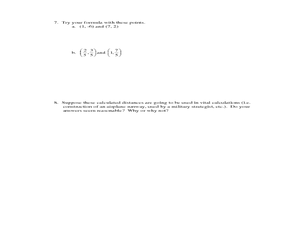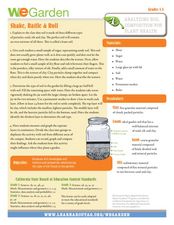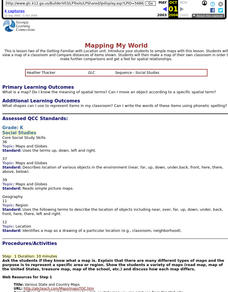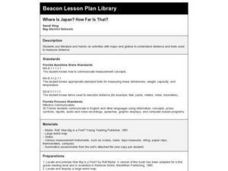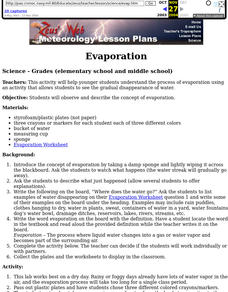Curated OER
Accentuate the Expositive: Unit 2 Expository Writing
Students analyze narrative passages in order to improve their writing skills. In this narrative writing lesson students use the same style of writing that they have analyzed in their own narrative passage.
Curated OER
Human Coordinate Plane, Using the Distance Formula
Pupils write the distance formula to solve equations for finding the distance between 2 points. In this distance formula lesson plan, students also write sentences explaining why their formulas would work.
Curated OER
Tenderfoot Rank Workbook
In this Boy Scout merit badge worksheet, students fill in the information necessary to attain Tenderfoot Rank. They describe the necessary camping gear they will need, participate in a camp-out, tell about safe hiking, and explain the...
Curated OER
The Trans Saharan Trade Route
In this trans Saharan trade route worksheet, learners respond to 6 short answer questions about African trade routes after they read the included article.
Curated OER
Mapping Roxaboxen
Fourth graders read Roxaboxen and draw a map of the Roxaboxen community. In this language arts and geography lesson, 4th graders use specifications given, adding features to the map as described in the book and creating a legend.
Curated OER
Shake, Rattle & Roll
Young scholars examine soil. For this science lesson, students examine the layers of soil. Young scholars collect soil from various locations and separate the layers. Students record and chart their findings.
Curated OER
Friends
Eighth graders write descriptively by using various adjectives in describing a friend to an English speaking pen-pal.
Curated OER
Our Barrio: Our Community/Adams & Normandie
Third graders examine various structures and people, including the region of Adams and Normandie, in Los Angeles. They conduct Internet research, and identify and locate features in the Adams/Normandie region during the past 60/70 years.
Curated OER
Birth of a Plant From a Seed
Students sow seeds of learning. In this biology lesson plan, students label parts of a dicotyledon seed by function as well as by proper names.
Curated OER
Where Is Hoku?
Students are introduced to map making and reading. Using maps, they identify the cardinal directions and discuss the importance of a legend. They analyze the human characteristics of the classroom and create overhead view maps of the...
Curated OER
Mapping My World
Students are introduced to simple maps and view a map of a classroom and compare distances of items shown.
Curated OER
Combining Geography and Literature by Mapping a Story
Students listen to or read a story on their own. Using the text, they describe the relative locations of the main events. In groups, they develop two and three dimensional maps of the story. They create a key and a title for their map.
Curated OER
A Trip through the Panama Canal
Students explore the Panama Canal. They study its history, location, reasons for being built, ownership, and so forth. They create presentations that demonstrates what students learned through their research activities.
Curated OER
Water Pollution Graphing Activity
Students describe and identify the link between land use activities within a watershed and water quality. They evaluate the quality of a "water sample" ( a bag of skittles), graph their results, and form a hypothesis about the land use...
Curated OER
Where Is Japan? How Far Is That?
First graders use literature and hands-on activities with maps and globes to explain distance and tools used to measure distance. They select tools to measure various objects in the classroom, then apply those concepts to their map...
Curated OER
Wisconsin History and Information
Fourth graders complete a multi-faceted project about the people, places, and government of Wisconsin. Working with traditional and technological resources, they research various topics related to the history of Wisconsin and create a...
Curated OER
Natural Hazards Research Paper and Oral Presenation
Students use the internet and look at a list of the world's countries and the natural hazards that impact them. They comprehend that it is sometimes called "Nature's Fury," each natural hazard has a heartbeat, a locational pattern, and a...
Curated OER
As You See It
Students determine how they would describe their library media center to someone who has never seen it. They illustrate their favorite section of the center and write a paragraph describing it. They make a class book with each student's...
Curated OER
Body and Mindscapes
Third graders view artwork by Robert Harris of landscapes and mountains. Using a map, they locate and identify the physical features of the Canadian province they live in. In groups, they use one of his paintings and add music to...
Curated OER
Mongolia Geography
Young scholars examine the geography and culture of Mongolia. Individually, they cut out cut-outs of animals to place on their maps and label the grasslands and desert areas. They locate major cities and rivers along with vegetation.
Curated OER
What Do Genes Look Like?
Seventh graders describe the basic structure of the DNA molecule. They identify what an inherited trait is and how it can be determined by one or more genes. Finally, 7th graders identify that plant and animal cells contain several...
Curated OER
Evaporation
Students explain the process of evaporation using an activity that allows students to see the gradual disappearance of water.
Curated OER
Ride the Wave!
Students examine how sonar works. They discuss the concept of sound waves, observe a demonstration of how sonar works using water, pie plates, and eyedroppers, and describe how sonar works in their own words.
Curated OER
Franklin Mountains
Students review the steps of the rock cycle. In groups, they identify the natural forces that cause weathering and erosion. They describe how sedimentary, metamorphic and igneous rocks might be formed in nature to end the lesson.



